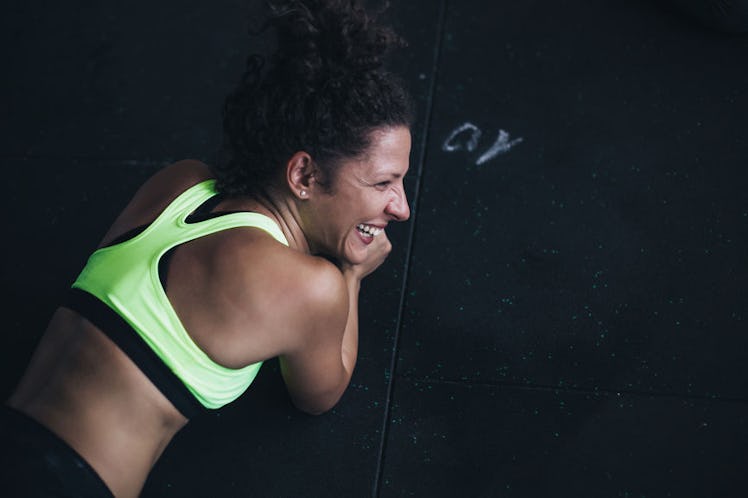
Science Says Doing This One Workout While You Study Can Give Your Brain A Serious Boost
I have great memories from college, but what I definitely don't miss are the study sessions. It was always complicated to find studying strategies that actually worked for me — flash cards never cut it, and acronyms didn't do much for me, either. According to new research, though, studying during your workout can actually be a really effective way to learn new things and improve your memory. I mean, I wish I'd known about this when I was still in college — seriously, I still have nightmares about flash cards to this day — but hey, maybe it'll help you fine-tune your own study habits.
The new study, which has been published in the British Journal of Psychology, revealed that aerobic exercise might just boost your brain power enough to help you solidify and remember newly learned information. According to ScienceDaily, researchers recruited 24 volunteers to take part in a visual working memory task — i.e. something like, being shown a picture with several objects for only 30 seconds, and then having to name as many of those objects as you can remember — in a few different settings. In one setting, as per ScienceDaily, the participants did the memory task while seated on a stationary bike; in another, they did the task while pedaling on the bike. Then they performed the task while standing on a treadmill, again while walking, and once more while completely at rest. The entire time, according to ScienceDaily, the researchers recorded the participants' electrical activity in their brains to help them measure the volunteers' ability to memorize information for the experimental task.
Ultimately, the researchers found that, not only does aerobic exercise seem to improve a person's memory and thinking skills, but simply standing in an upright position can boost your brain power in this way, as well. "Although modern society has evolved to become more and more sedentary, our brains may nevertheless perform best while our bodies are active," lead study author Dr. Thomas Töllner, of Ludwig-Maximilians-University Munich, said in a statement, as per ScienceDaily.
So get up and get moving, friends — it might just help you snag that A+ you've been fantasizing about. In fact, according to Dr. Zarinah Hud, a sports and integrative pain medicine specialist, several lines of research "support [the idea] that short bursts of exercise and regular exercise can have a positive impact on acute and long-term cognitive function," she tells Elite Daily in an email. "One way that we believe this occurs is through the increase in circulating nutrient-rich blood, along with increased oxygen to the brain."
When you exercise, something called mitochondria is produced (which prevents cellular aging), according to Dr. Hud. "This structure is responsible for energy production in our muscle and brain — hence promoting increased focus and cognitive function," she explains. "A few exercises that I recommend to many students and desk job-employed individuals are things like, 'pedal pumps,' which simply require you to move your ankle up and down repetitively, which mobilizes blood flow and exercises the contraction of your calf muscle."
During your next study session, Dr. Hud also recommends that you try marching in place while doing high knees. "[You can also] pump your arms, alternating each arm and each leg while sitting and studying," she suggests.
However, Dr. Hud tells me her favorite recommendation is this: Stand for three to five minutes every hour between studying, and do a few squats, high vertical jumps, stretches, and a bit of running in place. "This routine will improve blood flow, strength, and help with mental clarity," she says.
If you want something a bit more intense, though, Katie Boren, a NASM-certified personal trainer and ballerina with the American Ballet Theater, has a few options for you. “If you are listening to a lecture or an audiobook, you can always do cardio," she tells Elite Daily over email. "A treadmill, stationary bike, or StairMaster is relatively unobtrusive to your focus."
Boren also recommends doing wall sits while reading notes or flash cards, "or squat hovering over your chair for 30 to 60 seconds, three to four times," she says.
If all else fails, Orshi McNaughton, owner of the workout studio SIX, suggests opting for a standard plank pose to effectively combine your studying and your exercise. That's right, guys — take your notes to the ground, and crank out a couple of planks.
"Start on the floor and position your arms into a 90-degree angle with your forearms touching the floor, elbows positioned under your shoulders and your hands in front of you, shoulder-width apart," McNaughton tells Elite Daily over email. "Then position your legs by stepping your feet back, maintaining a straight line from head to toe. To align your spine, be sure to keep your face looking down." Tighten your core for as long as you can before releasing and dropping to the floor, she says. She suggests repeating this 10 to 15 times for four sets.
"This will allow you to strengthen your core," McNaughton explains, "[and] keep your eyes on your notes, books, or flashcards."